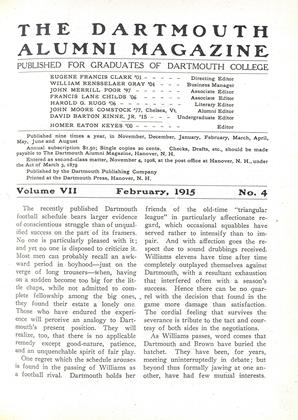The sphere of influence of Palæopitus the undergraduate governing council, has been gradually widening for several years, but due to the new manner in which it is constituted, and the cumulative effect of the previous growth of its power, the organization has more rapidly grown in strength during the fall of 1914 than at any other time in its history.
Under the present system, Palæopitus is composed of eleven members, of whom five are elected by and from the junior class to serve in their senior year, with six ex-officio members. The latter are the managers of the football, baseball, and track teams, the captain of the football team, the president of the Dartmouth Christian Association, and the editor-in-chief of The Dartmouth. Until the time of the present Palæopitus, the places of these six exofficio members were filled by selections from the junior class made by the graduating Palæopitus. The significance of the change lies in the fact that the selections of the retiring members were sometimes under suspicion of having been dictated by motives more political than public spirited.
To draw an analogy with a larger sphere, the legislation of Palæopitus during the past year has been away from common law toward statutory law. A distinct effort has been needed to extend the power of an organization existing- without any powers specifically vested beyond the right of making decision in specific cases where its interference was requested. The tendency toward the formulation of general polices, has, however, been manifested with ever greater sharpness for at least four years, until at present the council is in a position to enforce as general and sweeping a bit of legislation as the following: "Moved—that no undergradu- ate organization shall attempt to originate in the College without application to Palæopitus for permission to capitalize the name of the College." It will be readily seen that this regulation, which has provoked no dissent, prevents the establishment at Dartmouth of another fraternity or a club of whatever nature, without the assent of the undergraduate body through their representatives. A similar form of legis- lation was the rule passed early in the fall limiting the Delta Alpha night sessions in the dormitories to three nights a week.
To a certain extent Palæopitus has taken over from the College administration the punishment of undergraduate offences. An instance was the recom -mendation last spring by the then Palæopitus for the suspension of three under-classmen who were implicated in the publication of a slanderous "yellow-journal," and legislation against a repe- tition of the offence. The Palæopitus has always had charge of undergraduate rushes and celebrations: and in another field it was responsible for the awarding of modified "D"s to managers —the Athletic Council finally accepting the very form which Palæopitus recommended after a referendum to the undergraduate body.
As a compact and powerful means of intermediation between the faculty and the undergraduates, it is conceivable that the power of Palæopitus may become very considerable.
 View Full Issue
View Full Issue
More From This Issue
-
 Article
ArticleOXFORD IN WAR TIME
February 1915 By Conrad E. Snow '12 -
 Article
ArticleTHE AMERICAN ASSOCIATION OF UNIVERSITY PROFESSORS
February 1915 By Richard W. Husband -
 Article
ArticleGERMANY AT WAR
February 1915 By Max Mueller -
 Books
BooksThe Life of Thomas Brackett Reed
February 1915 By CHARLES R. LINGLEY -
 Class Notes
Class NotesLOCAL ASSOCIATIONS
February 1915 -
 Article
ArticleThe recently published Dartmouth
February 1915







